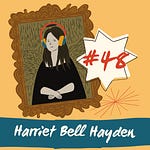To listen to this episode, upgrade to a paid subscription to Unruly Figures. Supporters get several bonus episodes a year, plus merch discounts and more!
🎙️ Transcript
Hey folks! It’s finally October—my favorite month of the year, because I love Halloween! For the last few years there’s been more awareness around using terms that have racist origins, and “spooky” has become a favorite no-no of the internet, with people saying that we shouldn’t be calling fall “spooky season.” Specifically, people have been saying that it was used as a racist pejorative against Black veterans in the US after WWII. So let’s dig into the etymology of the word just a little more.

“Spook” meaning spirit has been with us for a couple centuries. It was first used in an 1801 poem credited to "an old Dutch man in Albany," according to the Oxford English Dictionary. The word has Middle Dutch and Germanic origins meaning “a ghost” or “hobgoblin.” Relatedly, Norwegian has spjok for “ghost” or “spectre” and Swedish uses spok for “scarecrow.”1
It came into English in the early 19th century from German settlers in Pennsylvania.2 From there it was adapted to mean other scary and supernatural things, and eventually was linked to Halloween. A “spook house” was a haunted house by 1866, and when Spiritualism began to catch on, some people called the not-very-good mediums “spookists.”3 Later on, we see things like “spooktacular” as a pun on spectacular, meaning an impressive—but frightening—display in 1945 or so.4
The use of spook as a synonym for “spy” though, or “undercover agent” ramped up in the 1940s as well–maybe through a link that spies or being spied on is scary, or because of an idea that spies were supposed to move like ghosts through enemy territory. John le Carré used the word that way to describe his character spy character George Smiley, which seems to have popularized it.5
The word was first was applied to Black people in 1938, when Black pilots training at Tuskegee Institute during World War II called themselves the Spookwaffe (clearly a play on the German Luftwaffe).6 Black pilots used “spookwaffe” as a fond term for themselves and their fellow airmen.
Col. [Richard S.] Harder (Rip to his friends for reasons known only to us of the old "Spookwaffe," as it was fondly known during World War II) has had a distinguished career in the Air Force and deserves mention along with many other fine officers who are a product of the formerly "Negro Air Force." [Lt. Col. George E. Franklin, USAF (Ret.), in Ebony, Oct. 1968]7
In 1939, Life magazine printed this: “‘Spooks’ are a standard feature of every U.S. airport. They are the air-hungry amateur and novice pilots who haunt the hangars, hire planes, and learn to fly, not just to get places or save time but mostly for the fun of flying.” Apparently what had begun as a term for novice pilots became a term for all pilots in general, not just Black pilots.
Only after World War II did racist people use “spook” to refer to a Black person in a derogatory way. In the early 1940s, it actually briefly became a slur against Italian-Americans and/or Asian immigrants to the US. Author Nelson Algren was still using it as a derogatory term against white and Black people around the same time, but from what I’ve read it’s still a synonym for creepy or scary or even ghostly in his novels.89 Around the same time, college students picked it up to mean a shy or unattractive girl.10 For one word to have so many meanings in the 1940s seems to imply—at least to me—that it was a general pejorative term used against anyone that you didn’t empathize with, including people of other races.
But pretty quickly, the racist and generally mean usages were dropped and by the late 1950s, the term returned to its original origins: Spirit, apparition, or other things that frighten. It was more or less dropped from use except in very specific instances.

In the 1970s, Albert Einstein used the phrase “spooky action at a distance” to describe what we now call quantum entanglement.11 Coincidentally, we only had the technology to really prove quantum mechanics in the last ten years, proving Einstein’s nearly terrifying brilliance, in my opinion.
I’m not here to say that you can or can’t use the adjective ‘spooky’ or ‘spooky season’ this year. Use your best judgment here. But I wanted to bring a little nuance to the conversation because it often gets left out of conversations that Black pilots used ‘spook’ to refer to themselves in a positive light and that the word was briefly co-opted by racist people.
I’ll leave you with this:
Listen to this episode with a 7-day free trial
Subscribe to Unruly Figures to listen to this post and get 7 days of free access to the full post archives.













